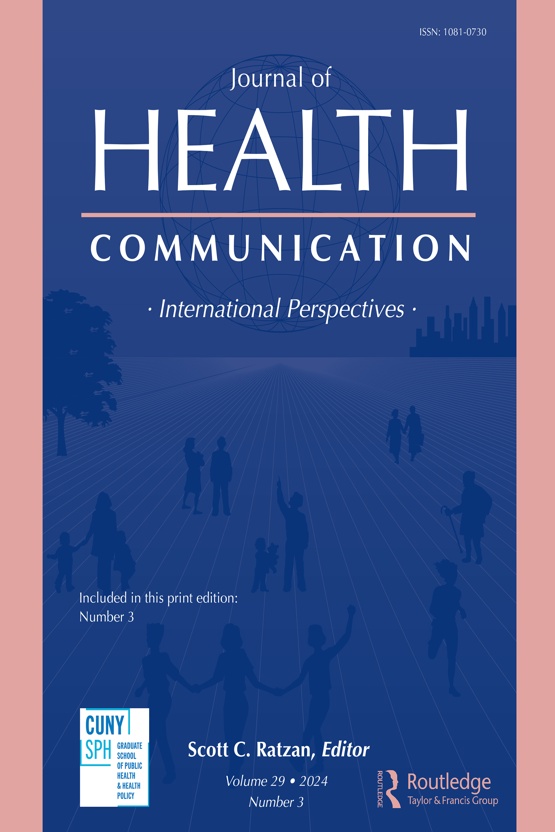Submit a Manuscript to the Journal
Journal of Health Communication
For a Special Issue on
Building Quality Health Communication in a Changing Information Environment: Confronting Misinformation through Theory and Practice
Manuscript deadline

Special Issue Editor(s)
Rebecca K. Ivic,
University of Alabama
rebecca.ivic@ua.edu
Building Quality Health Communication in a Changing Information Environment: Confronting Misinformation through Theory and Practice
This special issue brings together research from across the globe to advance how we understand, measure, and strengthen quality health information during unprecedented digital and social transformation. While misinformation erodes trust in science and health systems, it is critical to develop conceptual frameworks and empirically grounded strategies that not only define, evaluate, and sustain information quality, but guide how it can be acted upon in practice. We particularly welcome work that foregrounds theoretical innovation and demonstrates how methods (qualitative, quantitative, computational) are informed by theory to develop deeper insights into health communication processes and outcomes.
Recent work has underscored the need for integrative approaches that capture the relational, contextual, and systemic dimensions of health information (Ratzan et al., 2025), context-specific frameworks for seeking and using health information (Willoughby & Myrick, 2016), and called for methodological innovation that keeps pace with rapidly evolving platforms and communication science (Ivic et al., 2025) as well as understanding the impact and emotional tone of corrective information online (Lee, Wang, & Britt, 2025). Building on this trajectory, the special issue invites contributions that move the field forward by combining theory driven inquiry with novel methods, including computational approaches that allow for the large-scale, multimodal, and comparative study of health information systems.
Submissions are due September 30, 2025.
Areas of focus include (yet are not limited to):
- Theoretical frameworksthat reconceptualize quality health information in relation to trust, equity, governance, and the evolving digital environment
- Methods informed by theorythat connect conceptual models with empirical strategies for measuring, evaluating, and intervening in health information systems
- Novel computational approaches, such as the application of natural language processing and machine learning for misinformation detection; semantic and network analysis for mapping influence and relational dynamics; topic modeling and multimodal analysis
- Cross-platform, cross-national, and cross-language comparative studies
- Global and comparative perspectivesthat highlight regional contexts, equity concerns, and culturally embedded understandings of information quality
- Empirical studiesthat explore misinformation dynamics and interventions to strengthen resilience among communities, institutions, and systems
- Policy analysesexamining governance frameworks, certification systems, and regulatory strategies to ensure quality health information
- Economic, social, and health system impactsof investing in quality health information, including models of cost-effectiveness, sustainability, and scale
Ivic, R. K., Carmack, H. J., Amangalieva, G., & Nicholas, G. (2025). Thematic and Scholarly Trajectories in the Journal Health Communication. Health Communication, 1–9. https://doi.org/10.1080/10410236.2025.2505790
Lee, J., Wang, N. O., Britt, R.K. (2025). Impact of algorithm-driven comments on corrective information among young adults: focusing on emotional tone of comments and misinformation credibility. Online Information Review, 49 (3), 481–496. https://doi.org/10.1108/OIR-03-2024-0155
Ratzan, S. C., Ivic, R. K., Rubinelli, S., Rabin, K. H., Kim, H. K., & Parker, R. M. (2025). Advancing Health communication, a Call for the Future: 30 Years of the Journal of Health Communication: International Perspectives. Journal of Health Communication, 1–6. https://doi.org/10.1080/10810730.2025.2515206
Willoughby, J. F., & Myrick, J. G. (2016). Does Context Matter? Examining PRISM as a Guiding Framework for Context-Specific Health Risk Information Seeking Among Young Adults. Journal of Health Communication, 21(6), 696–704. https://doi.org/10.1080/10810730.2016.1153764
Submission Instructions
Point of Contact: Please reach out to Senior Editor, Rebecca K. Ivic, rebecca.ivic@ua.edu with any queries or questions.
